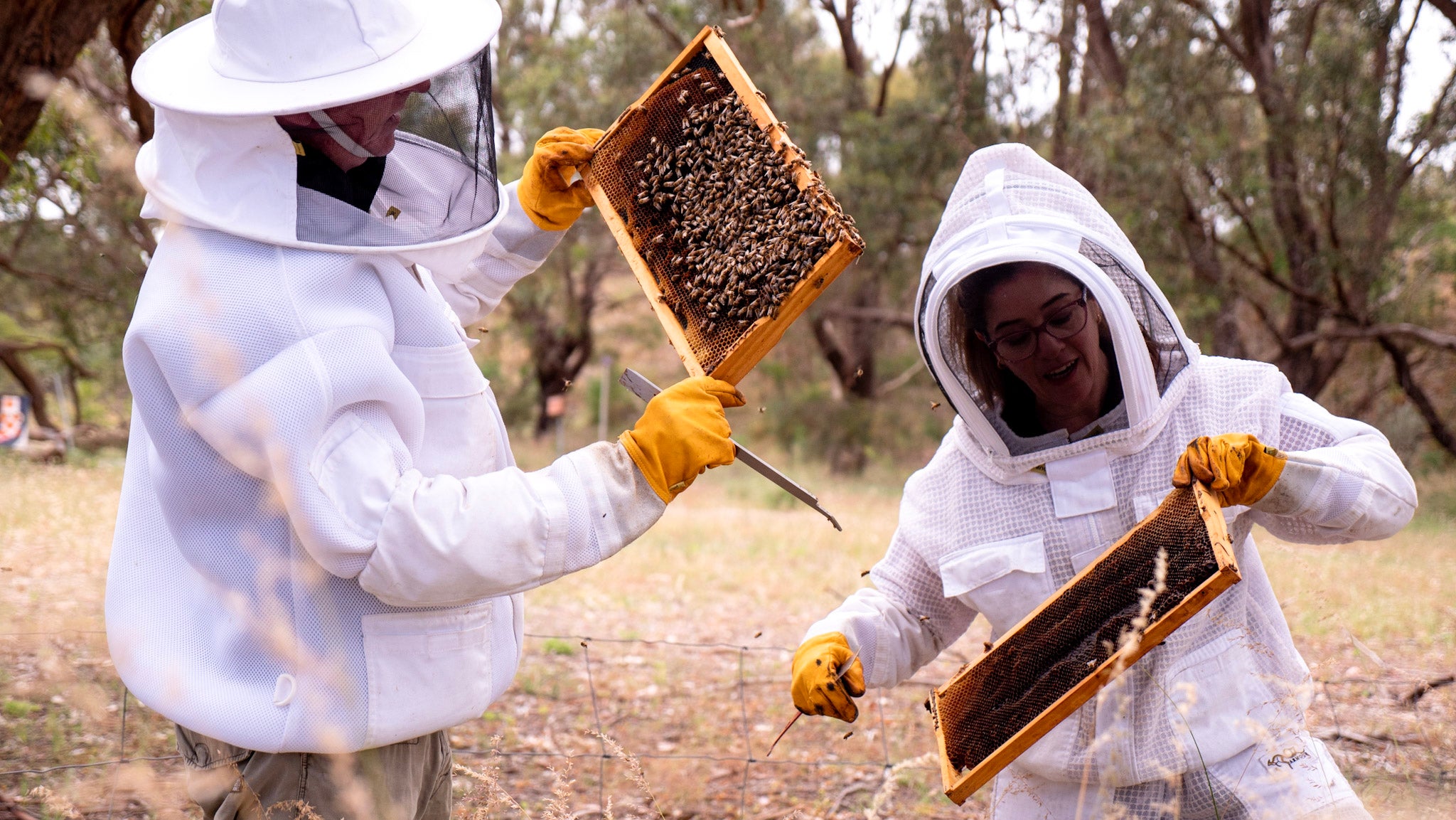When most people think of beekeeping, they think of a veiled white jumpsuit and rivers of golden honey. What they don’t know is that bees (and their keepers) play a hugely important role in our ecosystem and global agriculture.
What do bees do?
Bees are best known for the honey they produce, but their main role is pollination.
Between 75% and 91% of all plant species require pollination to reproduce and produce fruit and seeds. Bees are a big part of the process – honeybees are among the most competent and prolific pollinators in the world.
When bees fly from flower to flower in pursuit of nectar and pollen, they transfer the pollen that gets stuck to their fuzzy bodies to different plants. This not only fertilizes local plant species so they can reproduce through seeds and fruit, but also increases their genetic diversity, making each species stronger and more resistant to diseases and parasites.
By keeping the flora alive and healthy, bees also support the rest of the ecosystem – seeds and fruit become food for insects and animals, and new plants provide them with shade, cover and homes.
So, we know bees are important for the environment, but how important are they for your everyday life?

Beekeepers and agriculture
Walk through any supermarket, and you’ll see the fruits of a bee’s labour.
A huge proportion of the fruits, vegetables and nuts you eat are supported by bee pollination – over one-third of your food is produced with the help of bees and the keepers who loan them to farmers.
Crops pollinated by bees produce bigger and better-quality harvests. Some foods, such as almonds, depend entirely on bee pollination and won’t be produced at all in their absence. Pollinated crops even have a longer shelf life and generate less food waste.
Because of this, beekeepers are an essential part of agriculture – they lend or rent hives to farmers with flowering crops so their ever-industrious bees can pollinate the harvest. This collaboration benefits everyone, as the bees produce more honey after visiting all those flowers.
Bees are also vital for less edible crops such as cotton, canola and livestock feed, so they have a big impact on more aspects of modern life than you might think.

Protect the bees, protect the world
Given the importance of bees to
both the ecosystem and agriculture, it’s no surprise that beekeepers are doing their best to keep their bees alive and healthy in the face of a rapidly changing world.
Bees are hardy and robust but, like all living things, they have limits. Habitat destruction, pesticides, disease and climate change threaten bee populations all over the world. Beekeepers are vital, now more than ever, for preserving the bees we have left and helping them adapt to increasing adversity.
Losing bees would be more than just an inconvenience. Beyond the ecological damage and biodiversity loss, more than two-thirds of all agricultural crops would be affected.
We’d lose far more than honey – fruit, nut and berry production in particular would be crippled, while the dairy and livestock industries would take a big hit. The economic losses, food shortages and nutritional deficits would cause untold harm on a global scale.
Fortunately, beekeepers are doing what they can to ensure that bees survive. Providing cooler hives in warming climates, selectively breeding for disease and parasite resistance, and advocating for sustainable farming methods are just a small part of the worldwide conservation effort.
So, if you care for the environment or just enjoy a good meal, consider helping out the bees and the keepers who care for them.
Ask yourself – is a world without dessert worth living in?
References
Australian Academy of Science, ‘Getting the buzz on the value of bees’, accessed June 2022. https://www.science.org.au/curious/everything-else/bees
Bee farmers association, ‘What is bee farming?’, accessed June 2022. https://beefarmers.co.uk/about-bee-farming/what-is-bee-farming
Bjorn K. Klatt, Andrea Hozschuh, Catrin Westphal, Yann Clough, Inga Smit, Elke Pawelzik and Teja Tscharntke (2014) ‘Bee pollination improves crop quality, shelf life and commercial value’, accessed June 2022. https://royalsocietypublishing.org/doi/10.1098/rspb.2013.2440
Food and agriculture organisation of the United Nations, ‘Cooler hives help bees adapt to climate change’, accessed June 2022. https://www.fao.org/climate-change/news/detail/en/c/1401703/
Food and agriculture organisation of the United Nations ‘Good beekeeping practices for sustainable apiculture’, accessed June 2022. https://www.fao.org/3/cb5353en/cb5353en.pdf
Keng-Lu James Hung, Jennifer M Kingston, Matthias Albrecht, David A Holway and Joshua R Cohn (2018) ‘The worldwide importance of honey bees as pollinators in natural habitats’, accessed June 2022. https://royalsocietypublishing.org/doi/10.1098/rspb.2017.2140
Planet Bee Foundation, ‘We need bees’, accessed June 2022. https://www.planetbee.org/why-we-need-bees
University of Georgia, ‘Bees, Beekeeping and Protecting Pollinators’, accessed June 2022. https://bees.caes.uga.edu/bees-beekeeping-pollination/pollination/pollination-crop-pollination-requirements.html


